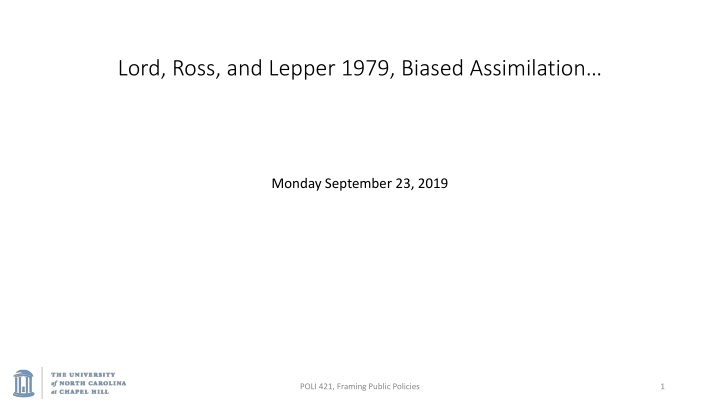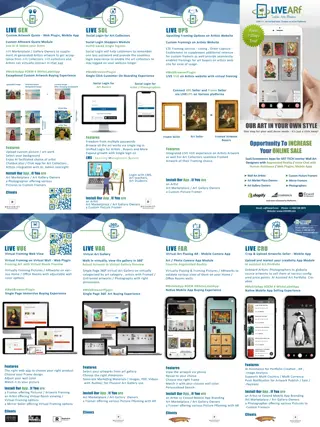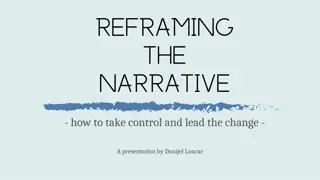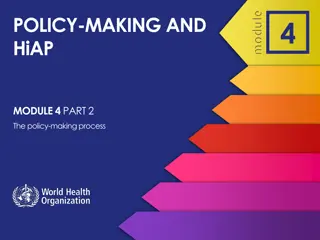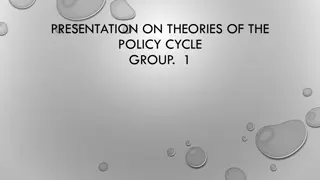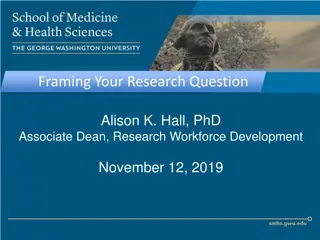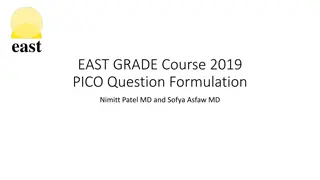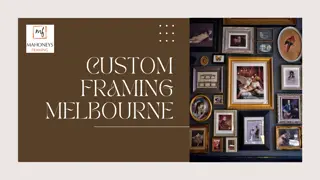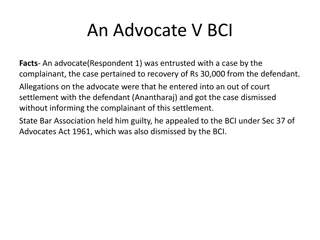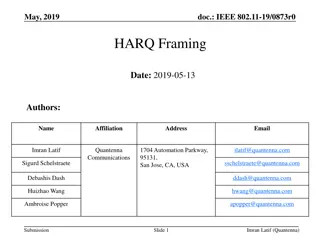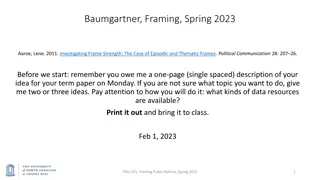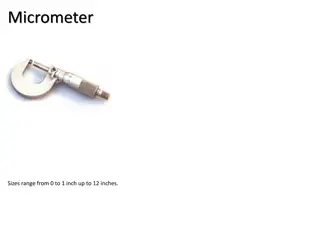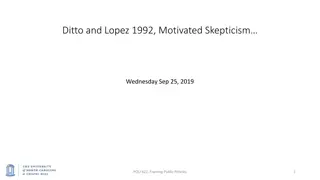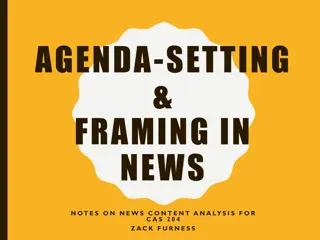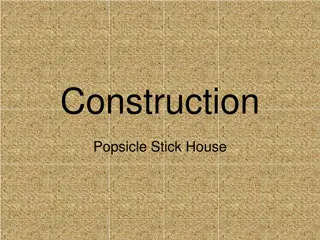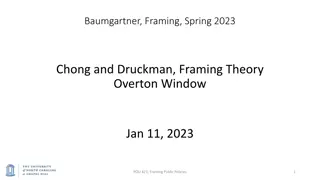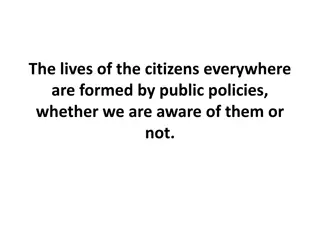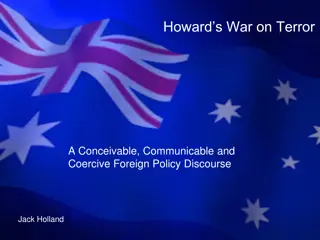Effective Strategies for Framing Public Policy Research
Engage in thorough research for your POLI 421 paper projects by identifying key actors, main arguments, and historical developments on both sides of the issue. Utilize various data sources such as newspaper databases, the Comparative Agendas Project, Google N-gram, and Congressional speeches to gather relevant information. Approach library staff and instructors for assistance with generating graphs and analyzing data effectively.
Download Presentation

Please find below an Image/Link to download the presentation.
The content on the website is provided AS IS for your information and personal use only. It may not be sold, licensed, or shared on other websites without obtaining consent from the author.If you encounter any issues during the download, it is possible that the publisher has removed the file from their server.
You are allowed to download the files provided on this website for personal or commercial use, subject to the condition that they are used lawfully. All files are the property of their respective owners.
The content on the website is provided AS IS for your information and personal use only. It may not be sold, licensed, or shared on other websites without obtaining consent from the author.
E N D
Presentation Transcript
Lord, Ross, and Lepper 1979, Biased Assimilation Monday September 23, 2019 POLI 421, Framing Public Policies 1
Paper projects, so far All the topics seem good Two were working on the same project, so I indicated that so you can touch base. For October 7: background literature. POLI 421, Framing Public Policies 2
Paper projects, so far First steps: See if there are already good books on these topics, covering the historical development. Read a few of those. Remember, you are only really looking for two things, so you can skim, read fast, and read 3 or 4 books instead of just one! Who are the key actors for and against? What are the main arguments on both sides? Can you possibly develop key-words or phrases that exemplify these ideas? If not, ok, work qualitatively If so, see about a database search in a newspaper going back as far as is relevant. POLI 421, Framing Public Policies 3
Paper projects, so far After Oct 7 assignment, though you can start early: Take those histories and identify the main key-words associated with each side. Use a media / newspaper database from the library web site: Nexis Uni (hundreds of newspapers) New York Times Historical collection (goes back to 1859 or something!) Newspapers.com, through the library, has hundreds of local newspapers, full text, going way back in time. Best here to do one newspaper at a time. But you can pick two or three. Other possible data sources: Comparative Agendas Project: US laws, bills, hearings, party platforms, State of the Union Speeches, etc., over time from 1947 to present; also many other countries have data here as well. POLI 421, Framing Public Policies 4
Paper projects, so far Other possible data sources: Google N-gram: Allows searches for any 3-word phrase in all the books in their databases. Web sites of individual interest groups and policy advocates, think tanks, etc. Don t pick just one, but pick several related ones pushing similar themes. Congressional speeches through the Congressional Record. See how the Dem and Rep speakers differ, while speaking on the same topic. Congressional Quarterly Almanac: A THICK annual book published continuously since 1947 that explains in detail the actions of congress, as well as the nature of various debates and controversies. So if you know that there was a particular bill or law, say in 1991, you can use this to go find coverage of it. Speak to Davis Library staff, they are super helpful. See me in office hours. I ll help you as well (I promise.) I have programs that can also help you generate graphs, and I ll do that for you if you give me data in the right format, which I can explain. POLI 421, Framing Public Policies 5
An example from last year Student gave me this: I gave back this: NYT_Cri minal NYT_M edical NYT_No Frame WP_Me dical WP_No Frame WP_Cri m year 1985 41 33 17 20 0 25 1986 63 47 54 52 0 61 1987 47 39 31 25 0 26 1988 93 52 60 49 15 82 1989 81 55 56 66 521 145 1990 87 45 38 56 376 104 POLI 421, Framing Public Policies 6
Examples of motivated reasoning Other words for similar ideas: Cognitive dissonance, tunnel vision, wishful thinking, blind spots General idea: if we like the conclusion, we easily accept the evidence as true. If we don t like the conclusion, we find ways to contest the evidence Does that strike you as true? Examples from everyday life Examples from public policy and government POLI 421, Framing Public Policies 7
Lord, Ross, and Lepper, 1979 People who hold strong opinions on complex social issues are likely to examine relevant empirical evidence in a biased manner. They are apt to accept "confirming" evidence at face value while subjecting "discontinuing" evidence to critical evaluation, and as a result to draw undue support for their initial positions from mixed or random empirical findings. Thus, the result of exposing contending factions in a social dispute to an identical body of relevant empirical evidence may be not a narrowing of disagreement but rather an increase in polarization (2098). POLI 421, Framing Public Policies 8
Lets unpack that and set the boundary conditions People who hold strong opinions What if the opinion is not as strong? on complex social issues What if the issue is not that complex? Then evidence matters. apt to accept confirming evidence at face value How likely? How strong does the confirming evidence need to be? Totally at face value, or just a shade? while subjecting disconfirming evidence to critical evaluation How disconfirming? How critical is the evaluation? POLI 421, Framing Public Policies 9
Lets look at their study and results Pro and anti-capital punishment attitudes divide two groups. Present both groups with empirical studies that show that capital punishment does or does not deter. How good were the studies: how well were they conducted? Ratings of quality: ones that agree with my opinion are better! (p. 2102, table 1). Ratings of how convincing the studies were: same findings. Agreement and rebuttals to the study: totally predictable Attitude change: everyone got their attitudes reinforced, even though the evidence was neutral / balanced (Tables 2-3, 2103-2104). POLI 421, Framing Public Policies 10
Start with an attitude, then from there evaluate the supporting or challenging evidence. Two models of decision-making: Lawyer defending a client (The client: your predisposition. The lawyer: your reasoning abilities.) Judge or Scientist neutrally evaluating the evidence for and against. Key question: do you care? Are you motivated to reach a certain conclusion? Goal: Accuracy, or direction? POLI 421, Framing Public Policies 11
Who should run the forensics lab? Police investigators need to solve the crime So when they send a blood sample to be tested, should the investigator be aware of who is the suspect? Studies: even when they told forensic anthropologists the simple fact that the dead body had a female or male name, they were more likely to find that the skeleton matched a male or female description Police line-ups: You want to convict the guilty person, certainly. But what if you prematurely conclude that you know who that person is, when your theory is wrong? You can be prone to confirm your incorrect theory, ignoring or downplaying evidence that fits another. POLI 421, Framing Public Policies 12
What are the boundary conditions of this theory? (Always a good question to ask) Cases where it would not apply: Simple issues: evidence matters Overwhelming evidence: you can t ignore it. Where people don t hold strong opinions (no motivation) Where people are motivated not by a direction, but by a desire to be accurate (accuracy goal). When does that happen? Cases where it applies, extra-super-duper Complicated issues (e.g., where the evidence is not overwhelming, or is based on non-comparable trade-offs), issues where the decision-maker has a strong bias. Examples of where it is most and least likely to be an issue? POLI 421, Framing Public Policies 13
Times when you care, and when you dont From personal life and from public policy, think of two examples of things where you care deeply about protecting an opinion. Family / group / school / identity loyalty? A policy preference, say on the issue of abortion perhaps? Think of others where you really do want to protect your opinion. Think of examples where you do not have a dog in that fight: Will the final exam in this class be at this time or that time? (You just want the right answer, based on evidence!) (Accuracy motive.) Who will win the softball game between Columbia and Brown? (Huh? You don t care, so you have no motivation to promote one idea over another.) Think of other cases where you don t try to protect your opinion. POLI 421, Framing Public Policies 14
